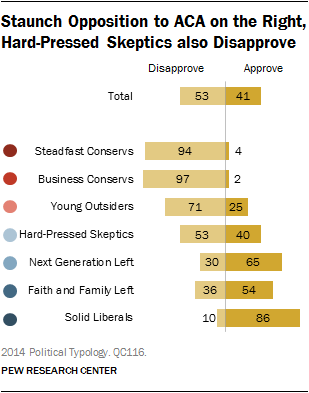
The Affordable Care Act has been one of the most divisive issues of Barack Obama’s presidency. The new typology finds nearly universal opposition to the law on the right. By contrast, support for the law on the left is not nearly as widespread or intense.
Overall, more disapprove (53%) than approve (41%) of the health care law. Opinion about the legislation is little changed since last fall.
Overwhelming percentages of Business Conservatives (97%) and Steadfast Conservatives (94%) oppose the law, with about nine-in-ten in each group expressing very strong disapproval (88% of Business Conservatives, 90% of Steadfast Conservatives).
Most Young Outsiders (71%) disapprove of the law, 53% very strongly. And even among the Democratic-leaning Hard-Pressed Skeptics, there is more opposition (53%) than support (40%).
While 86% of Solid Liberals say they approve of the health care law, other Democratic groups are less enthusiastic. The Next Generation Left approves of the law 65% to 30%; a smaller majority of the Faith and Family Left (54%) back the law. Among the three groups, Solid Liberals are the only one in which a majority (64%) very strongly approves of the
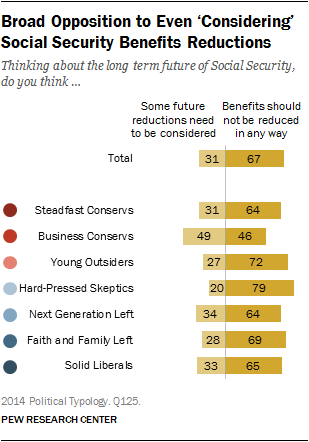
While the public is concerned over the budget deficit and government spending, there is broad opposition across most political typology groups to reductions in Social Security benefits. When asked to think about the program’s long term future, two-thirds (67%) of the public say that Social Security benefits should not be reduced in any way, while just 31% are willing to say that some reductions in benefits for future retirees need to be considered.
Business Conservatives are the only group in which a majority does not oppose the consideration of cuts in Social Security benefits. However, nearly as many Business Conservatives say benefits cuts should not be considered (46%) as say they should be on the table (49%).
Among all other groups, at least six-in-ten say reductions in Social Security benefits should not be considered.
Marijuana Legalization Supported
In recent years, Pew Research surveys have documented the rise in support for legal marijuana, as it has become a majority viewpoint among the public. In the 2014 Typology survey, 54% say they think marijuana should be made legal, while 42% do not think it should be legal.
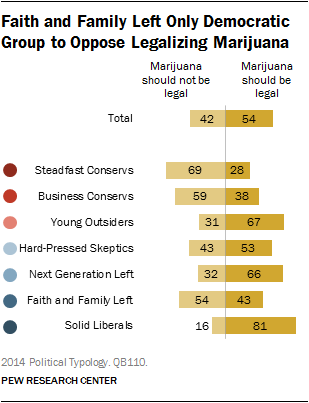
Support for legal marijuana is highest among Solid Liberals: about eight-in-ten (81%) say they think marijuana should be made legal; just 16% say it should not be legal. Slimmer majorities of the Next Generation Left (66%) and the Democratic-leaning Hard-Pressed Skeptics (53%) also support legal marijuana.
However, the Faith and Family Left – defined by their liberal positions on the role and size of government and more conservative views of social issues – oppose legalizing marijuana by a 54% to 43% margin.
On the right, views of legal marijuana split the solidly Republican Steadfast and Business Conservatives from the Republican-leaning Young Outsiders. Majorities of Steadfast Conservatives (69%) and Business Conservatives (59%) say marijuana should not be made legal. However, Young Outsiders take the opposite view: 67% say marijuana should be legal and 31% say it should not be made legal.
Sharply Divided Views over Gun Control
When it comes to the debate over gun policy, the public is evenly split: 49% say it is more important to protect the right of Americans to own guns, while 48% say it is more important to control gun ownership. Overall opinion on gun control has been little changed for more than a year.
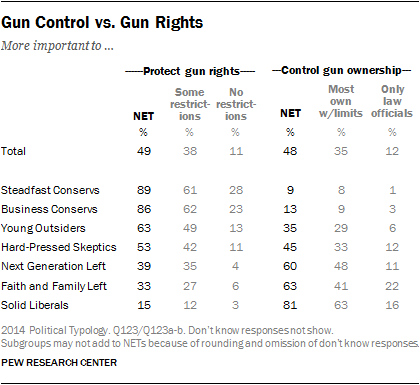
While divided on whether the gun policy priority should be protecting gun rights or controlling gun ownership, most Americans on either side of this issue say that people should be able to own guns, though with some limits or restrictions on ownership.
Of the 49% who prioritize gun rights, most say there should be some restrictions on ownership (38% of the public). Similarly, a majority of those who prioritize gun control say that most Americans should be able to own guns with certain limits in place (35% of the public). Relatively few Americans say that there should be no restrictions on gun ownership (11%), or that gun ownership should be limited to only law enforcement and security personnel (12%).
On gun policy, the difference in views between Solid Liberals and Steadfast and Business Conservatives are about as large as any seen in the typology survey.
Nearly nine-in-ten Steadfast Conservatives (89%) and 86% of Business Conservatives say it is more important to protect gun rights than to control ownership. By contrast, a broad majority of Solid Liberals (81%) say it is more important to control gun ownership.
The other Typology groups generally tack toward the dominant position within the party they are more affiliated with. About six-in-ten of the Faith and Family Left (63%) and Next Generation Left (60%) prioritize controlling gun ownership.
Hard-Pressed Skeptics are divided with about as many saying it is more important to protect the right of Americans to own guns (53%) as control gun ownership (45%).
The right-leaning Young Outsiders say protecting the right of Americans to own guns (63%), rather than controlling ownership (35%), should be the more important priority.
Opposition to Common Core among Republican Groups
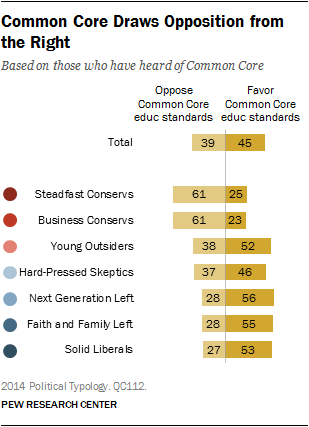
Overall, 60% of the public has heard either a lot (18%) or a little (41%) about the Common Core education standards for students in grades K-12; 40% say they have heard nothing at all about this.
Among those who have heard of the standards, 45% say they favor Common Core while 39% are opposed. Intense views on the issue, while not widely held, are more prevalent among those opposed than in favor of the standards: 15% say they strongly oppose Common Core, compared with 9% who strongly favor it.
A relatively new issue to public debate, Common Core has quickly taken on a partisan cast.
The two solidly-Republican groups, Steadfast and Business Conservatives, oppose Common Core by more than two-to-one (61%-25% and 61%-23%, respectively).
By contrast, majorities of the Democratically-oriented Next Generation Left (56%), Faith and Family Left (55%), and Solid Liberals (53%) say they favor the Common Core education standards.
Views of Casino Gambling
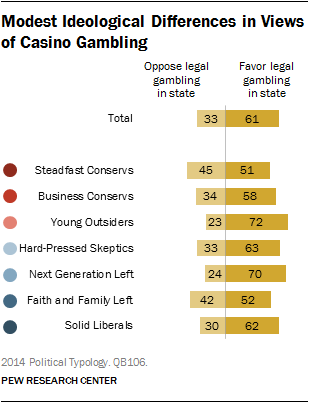
There are only modest differences in views across typology groups on this question. At least half of all groups say they favor legal casino gambling in their state.Most Americans say they favor legalized casino gambling in their state (61%), while only about half as many say they are opposed (33%).
Steadfast Conservatives express the greatest level of concern over legalized gambling in their state: 51% favor it, 45% are opposed.
Support is highest among Young Outsiders (72%) and the Next Generation Left (70%), the two youngest typology groups.